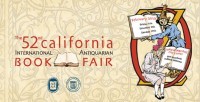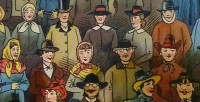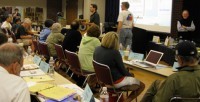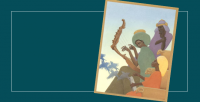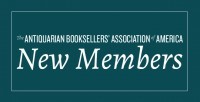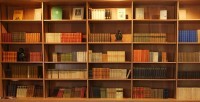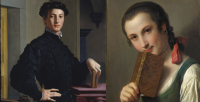The 52nd California International Antiquarian Book Fair returns to the Oakland Marriott City Center, Oakland, California, over the weekend of February 8-10, 2019. Recognized as one of the world's largest and most prestigious exhibitions of antiquarian books, the 52nd California International Antiquarian Book Fair returns to Northern California, Friday, February 8 through Sunday, February 10, 2019 at the Oakland Marriott City Center. Sponsored by the Antiquarian Booksellers' Association of America (ABAA) and the International League of Antiquarian Booksellers (ILAB) and featuring the collections and rare treasures of nearly 200 booksellers from over 20 countries around the world, the three-day book fair offers a rich selection of manuscripts, early American and European literature, modern first editions, children's books, maps and autographs, as well as antiquarian books on history, science, law, architecture, cooking, wine, and a wide range of other topics. This year's Book Fair will include a special exhibit by the Book Club of California, an active association of over 800 major California collectors with interests in rare books and manuscripts of all types. Founded in 1912, the Club's library is dedicated to collecting and sharing works of California fine printers; resources on book making, book design, and book history; and books of historical significance. One side of this bi-faceted exhibit will display a selection of materials by California women printers and book artis... [more 2019 California Book Fair]
The 2019 California International Antiquarian Book Fair takes place in Oakland, California February 8-10, 2019. Nearly 200 rare-book dealers from around the world will be bringing their most-outstanding items to surprise and delight book collectors. Some of the ABAA members attending preview their wares below... Harold Arlen. "The Wizard of Oz" Record Set - Inscribed by the Composer! 1939. 4-disc set of first issue 78-RPM records of the cast-recording soundtrack album for the beloved film, inscribed by the composer, Harold Arlen, to his brother and sister-in-law. Housed in original illustrated covers. Inscribed in pen on the first record sleeve: "For Julie + Jean, Love Harold 12-18-39". Songs include "Over the Rainbow", "Munchkinland Part I & II", "If I Only Had a Brain", "If I Only Had a Heart", "The Merry Old Land of Oz", and "We're Off to See The Wizard". This record set includes the only known release of the movie's deleted musical number, "The Jitterbug", as the album was created and distributed before filming wrapped. Discs exhibit very little handling, but are untested. Front cover detached but present, with part of cloth tape torn. Edge wear to the covers, with cloth tape repair between inside front cover and first record sleeve. Overall very good. Songwriter Harold Arlen (born Hyman Arluck) is to thank for some of the most iconic songs of the twentieth century, including "Over the Rainbow," "Get Happy," "Stormy Weather," and "The Man That Got Away." He collaborated w... [more CA Book Fair: 2019 Preview]
ABAA-member Frank S. Klein passed away at his home on January 12, 2019. Obituary: Upon graduation from Cuyahoga Falls High School during World War II, Frank was drafted into the Army. Following his discharge he enrolled at Kent State University where he excelled not only scholastically but also athletically as an outstanding tackle on their varsity football team. Frank, with other Kent students, founded Phi Gamma Theta Fraternity that later merged with Phi Delta Theta. He taught a few months, then decided to pursue a military career. His ROTC training at Kent State qualified him to enlist as a lieutenant in the Army's officer training program and he quickly rose through the ranks. He served in Korea and in Vietnam. Frank retired in 1970 as a Lieutenant Colonel working at the Pentagon in Army Aviation. He then took over operation of The Bookseller, Inc., a shop specializing in used and rare books that he and his father had established in the 1940s. Frank's daughter Andrea now operates The Bookseller, Inc. located in the Wallhaven area. Until his health failed, Frank was very active in several book-related organizations. With some colleagues he founded NOBS (Northeast Ohio Booksellers Society). He was a member of the ABAA (Antiquarian Booksellers Association of America) and was recognized locally and nationally as an expert in the field of antiquarian books and ephemera. (Read the full obituary at Legacy.com...) Friend and fellow ABAA-member Andrew Cahan shared this touching me... [more In Memoriam: Frank Klein]
The Colorado Antiquarian Book Seminar (CABS) received an anonymous donation last year which forms the basis of an endowment fund. Recently re-elected ABAA member Daniel De Simone was instrumental in securing the donation to fund the longevity of the program. In the near-term, the seminar will use the funds immediately to re-launch a more robust and informative website. Seminar directors Lorne Bair and Rob Rulon-Miller are also considering moving out of Colorado -- where they have hosted the week-long seminar for more than 20 years -- to a location that is more easily accessible to attendees. The directors are considering institutional partners in the Midwest and on the East Coast for a move as early as 2020. Even more notably, the seminar has renewed its focus on achieving gender parity and nurturing a more diverse industry. Lorne Bair remarks, “CABS is very conscious of the role it plays in the book trade, as a gateway for many who may be just testing the waters of bookselling. As such, we feel a special responsibility to create and sustain an atmosphere that, while challenging (because bookselling is nothing if not a challenging business!), is equally non-threatening, inclusive, and collaborative for all who enter — because we know that the seeds we're planting now will help define what the American book trade as a whole looks like for years down the road.” The faculty make-up is close to achieving this goal, with slightly more men than women instructors. More recentl... [more Colorado Antiquarian Book Seminar Plans Diversity Initiatives]
Dear Members, The following items have been reported missing from Ken Sanders Rare Books. Please contact Ken if you know the whereabouts of these items. > Ken Sanders Rare Books, ABAA > 268 South 200 East > Salt Lake City UT 84111 > (801) 521-3819 >> ksanders@kensandersbooks.com > www.kensandersbooks.com 1. Gass, Patrick. A Journal of the Voyages and Travels of a Corps of Discovery, Under the Command of Capt. Lewis and Capt. Clarke of the Army of the United States, from the Mouth of the Missouri through the Interior Parts of North America to the Pacific Ocean, During the Years 1804, 1805 and 1806. Philadelphia: Printed for Matthew Carey, 1810. Second edition. 262pp. Sextodecimo Rebound in 1/2 leather over marbled boards. New endsheets and pastedowns. Tissue repair to frontispiece. Includes all six engravings. 2. Smith, Lucy Mack. Biographical Sketches of Joseph Smith the Prophet, and His Progenitors for many Generations. Liverpool: Published for Orson Pratt by S.W. Richards, 1853. First edition. 297pp. Duodecimo Full black diced pebbled leather with the title gilt on the backstrip. Near fine. Name in ink on the front pastedown. In custom burgundy faux-leather clamshell case with black gilt-stamped spine label. 3. Sloan, Edward Lenox. The Salt Lake City Directory and Business Guide for 1869. Salt Lake City, UT: E. L. Sloan & Co., 1869. First edition. 57-219pp Octavo Original 1/4 gray cloth under black boards with advertisements printed in gilt on the boards. Very good. Light r... [more Missing from Salt Lake City]
An announcement from the Northern California Chapter of the Antiquarian Bookseller's Association of America: Announcing the Winners of the inaugural California Young Book Collector's Prize. The quality of all of the applications made it extremely difficult to choose the winning candidates, and the committee would like to extend its sincere thanks to each and every applicant who took the time and effort to apply. Our third place award went to Megan Messinger, from Pomona. Her collection “is an attempt to bring together my two great loves” – medicine and theater. While these two interests may seem very far apart, Megan has found a place where they merge: in the staging of violence. A former fight choreographer and teacher of stage combat, the merging of medicine and theater has deepened her understanding of “the place of violence in society; why it is staged the way it is, both now and in the past; and how performances of violence and medicine are two sides of the same coin.” The second place award was given to Jessica Jordan of Palo Alto. Jessica's collection revolves around the love of the artwork, and illustrations, of an interracial couple – Leo and Diane Dillon. The couple faced many barriers when they first began to build their life and joint career together; but by the time of Leo Dillon's death in 2012, they had become known as two of “the world's pre-eminent illustrators for young people”. The Dillons were the only consecutive winners of the Caldecott M... [more CA Young Book Collector’s Prize Winners]
Meet the newest members of the Antiquarian Booksellers' Association of America! Full Members William C. Baker W. C. Baker Rare Books & Ephemera (Brooklyn, NY) -- Avant-garde Literature, Americana, Science, Religion, Performing Arts Will Baker operates W. C. Baker Rare Books & Ephemera, a firm specializing in Americana, counterculture, and unusual currents in science, religion, and the performing arts. Will grew up in northeast Ohio, studied religion at Carleton College, and first moved to New York in 2001 to pursue a master's degree in museum studies at NYU. During that time, he worked for the late sword swallower and collector Johnny Fox, who encouraged him to consider more seriously his long-held interest in the rare book trade. After attending Rare Book School, Will was hired as a cataloger in Americana by the William Reese Company, where he worked for five years. In 2011, Will took a hiatus from the trade to lead a revitalization program at New Haven's Institute Library as its first executive director. He returned full-time to the business in 2014 and to New York two years later. Michael Brenner Brenner's Books - Rare & Collectable (Manasquan, NJ) -- Mystery, Sci-Fi, Signed Firsts, Books about Books Always a voracious reader, Michael Brenner had been buying, selling and passionately collecting books for over 30 years before he decided, after a career in the wine business, that he wanted to sell books full-time. He was a moonlighting bookseller for a few years before atten... [more New Members]
The Thomas Mann House has paired up with ABAA-members Brad and Jennifer Johnson of Johnson Rare Books & Archives in Covina, California, to recreate the author's personal library during the years he spent in California. This informative video details the exciting project... We asked Dr. Nikolai Blaumer, Program Director of the Thomas Mann House, about this ambitious project: ABAA: What happened Thomas Mann's original library at the end of his life? The Mann family left the country in 1952, after Thomas Mann was accused of Un-American activities. Parts of his private library were taken to Switzerland, where Thomas Mann spent his last years. Those books are part of the Thomas Mann Archive in Zurich today. Other books (approximately 3500) were sold to a bookseller in Santa Monica. The German Government bought the house in 2016 after it was privately owned for more than sixty years. Many parts of the house remained in their original condition -- including the former study of Thomas Mann and its bookshelves. This room is still the centerpiece of the house -- and a wonderful opportunity to keep the spirit of Thomas Mann alive. ABAA: Who will be using this library when completed? The library will first of all be a study for our fellows, who spend three to ten months in the US. We believe that they will be grateful for the reconstitution of the library -- even though their work reaches beyond Thomas Mann research. Over time, the library will grow according to the interests and experti... [more Recreating Thomas Mann’s Library]
The Northern & Southern California Chapters of the Antiquarian Booksellers' Association of America would like to announce The California Young Book-Collector's Prize. UPDATE: Deadline extended until December 15. Submissions should be sent as a .pdf file to Ben Kinmont, Chair of the Northern California Chapter of the ABAA, at bkinmont@gmail.com. Most great collectors started when they were young, and most great collections started with a passion for a particular object or subject. When these objects are books and manuscripts, the collectors are called bibliophiles, or lovers of the book. Curiously, the love of books continues unabated today, despite their increasing rarity and the rapid growth of digital media. Some might even argue that the printed page has taken on a new meaning and cultural resonance in our era of computers and electronic texts. In recognition of the next generation of bibliophiles, we have created The California Young Book-Collector's Prize. The competition is open to collectors aged 35 and under who are living in California. All collections of books, manuscripts, and ephemera are welcome, no matter their monetary value or subject. The collections will be judged on their thoroughness, the approach to their subject, and the seriousness which with the collector has catalogued his or her material. The winner of the competition will be awarded: 1. A gift certificate of $500 to spend at the 2019 California International Antiquarian Book Fair 2. An exhibition of... [more ABAA’s California Chapters Launch Book-Collecting Prize, Deadline Extended!]
The following item was sent to London but was mis-delivered and is now missing (photo below): NORTON, Thomas. To the Quenes Maiesties poore deceiued Subiectes of the North Countrey A warning against the dangerous practices of Papistes A Bull graunted by the Pope to Doctor Harding A disclosing of the great Bull . STC 18682, 18686, 18678, 18679. Imprints vary, London, 1569 & 1570. Later calf, gilt, the joints somewhat rubbed, a few sidenotes just trimmed, else quite clean, the Bute copy (with bookplate). If you are offered this item or have any information pertaining to it, please contact Joe Luttrell at rarelaw@meyerbos.com or (415) 255-6400. [more Missing: “To the Quenes Maiesties poore deceiued Subiectes of the North Countrey…”]


